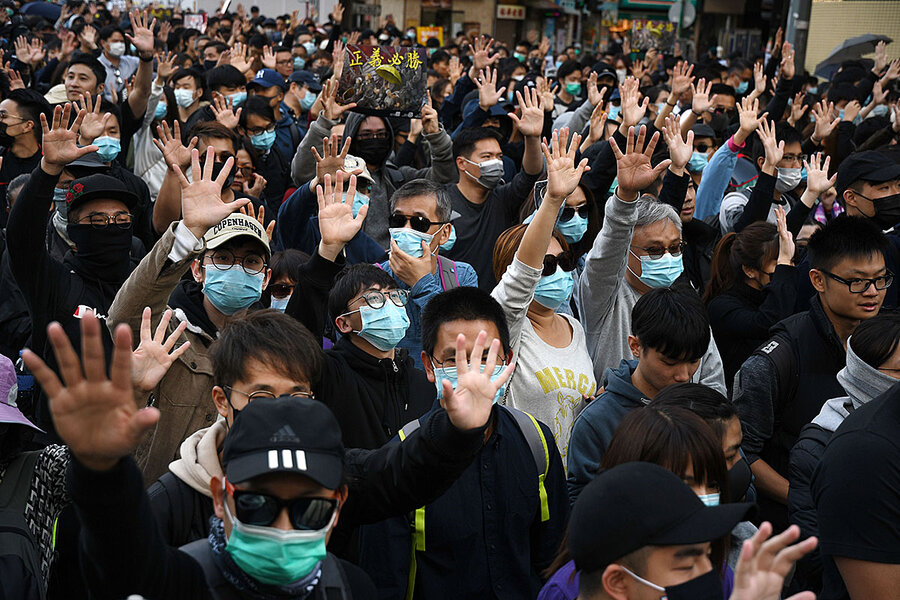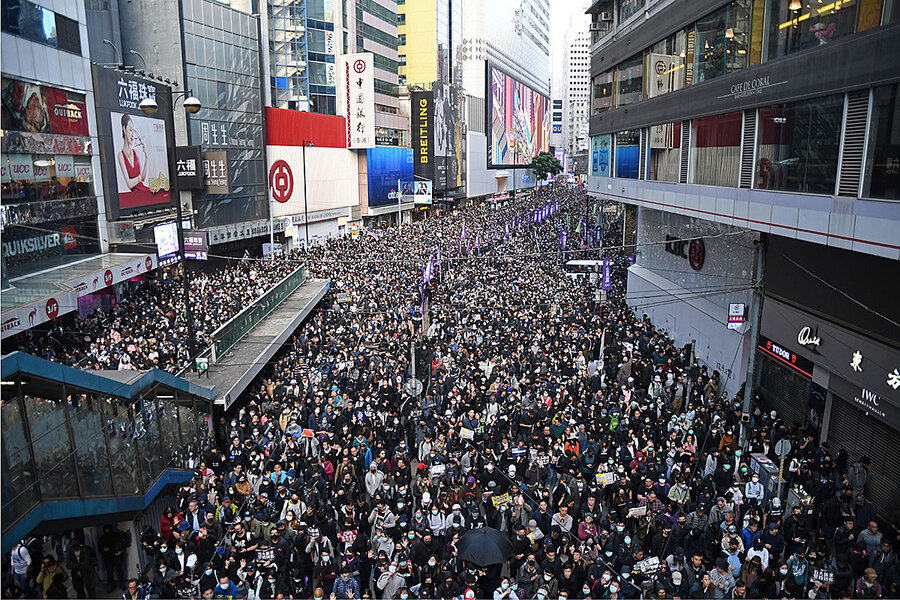By Ann Scott Tyson

At the biggest pro-democracy protest since June, protesters show the palms of their hands as they call on the government Dec. 8, 2019, to meet all five of their key demands, including universal suffrage and an independent investigation of police.
Hundreds of thousands of protesters staged one of Hong Kong’s biggest marches since June on Sunday, in a dramatic sign of the strength of public support for the six-month-old campaign for greater democracy and autonomy from China.
The overwhelmingly peaceful protest was approved by police and saw an estimated 800,000 people surge through downtown Hong Kong, according to the organizer, the Civil Human Rights Front, the territory’s biggest pro-democracy group.
The group also led marches of an estimated 1 million and 2 million people in June that helped push Hong Kong’s government to withdraw a controversial China extradition bill.
Chanting “Five Demands, Not One Less,” protesters of all ages and walks of life raised their outstretched palms as the vast crowd spilled out of Victoria Park and slowly flowed down Hennessy Road and Queensway into Central, the heart of Hong Kong’s financial district.
Parents carrying children and retirees holding umbrellas like parasols against the sun joined black-clad students wearing gas masks, as the nonviolent and more radical elements of protesters joined forces in a striking display of unity that analysts say is the hallmark of the movement.
“There is an ethic of solidarity … that encourages people to stay united,” says Francis Lee, director of the School of Journalism at The Chinese University of Hong Kong, one of a team of scholars surveying public opinion on the protests.
“There is an ethic of solidarity … that encourages people to stay united,” says Francis Lee, director of the School of Journalism at The Chinese University of Hong Kong, one of a team of scholars surveying public opinion on the protests.
Indeed, using protest art, banners, and chants, the crowd on Sunday articulated slogans that stressed their strong bonds.
“No derision. No division. No denunciation,” read one poster on display along the march route. “Contributing in our own ways, we traverse toward the same summit as one,” it said, showing a protester waving others onward and upward.
As many as 800,000 people participated in a peaceful march Dec. 8 down a major road on Hong Kong Island.
Polls show that about 70% of Hong Kong’s 7.4 million people are in favor of the pro-autonomy movement, according to Professor Lee’s research.
“No derision. No division. No denunciation,” read one poster on display along the march route. “Contributing in our own ways, we traverse toward the same summit as one,” it said, showing a protester waving others onward and upward.

As many as 800,000 people participated in a peaceful march Dec. 8 down a major road on Hong Kong Island.
Polls show that about 70% of Hong Kong’s 7.4 million people are in favor of the pro-autonomy movement, according to Professor Lee’s research.
The movement has lessened the gaps in political views between Hong Kong’s moderate, pro-democracy, and localist supporters, but has heightened polarization between those groups and the pro-establishment camp, which favors closer ties with Beijing, he says.
About 89% of Hong Kongers now believe that a combination of peaceful protests and radical tactics can achieve the best outcome, while 92% think that radical actions are understandable “when the government fails to listen,” a mid-September poll shows.
Protesters on Sunday included civil servants, teachers, and other professionals, who voiced deep disdain for how Hong Kong’s government, led by Chief Executive Carrie Lam, has handled the political crisis.
About 89% of Hong Kongers now believe that a combination of peaceful protests and radical tactics can achieve the best outcome, while 92% think that radical actions are understandable “when the government fails to listen,” a mid-September poll shows.
Protesters on Sunday included civil servants, teachers, and other professionals, who voiced deep disdain for how Hong Kong’s government, led by Chief Executive Carrie Lam, has handled the political crisis.
Posters mocking Lam are mainstays of the protests, as her popularity has fallen to a record low.“I work for the government, but I don’t agree with the government,” said one middle-aged civil servant as he marched through the financial district, requesting anonymity because of his position.
One of the protesters’ main demands is to elect Hong Kong’s chief executive by universal suffrage, instead of through the current, Beijing-controlled selection process.
One of the protesters’ main demands is to elect Hong Kong’s chief executive by universal suffrage, instead of through the current, Beijing-controlled selection process.
Some 81% of people polled in October said they seek political reforms.
Lam is viewed as beholden to Beijing, and prominent posters on Sunday depicted her in the embrace of Chinese dictator Xi Jinping.
While Lam has not achieved a political resolution to the crisis, she has ordered Hong Kong’s 30,000-strong police force to quell the unrest, leading to more than 6,000 arrests, the heavy use of tear gas and rubber bullets, and a few instances of firing live ammunition.
While Lam has not achieved a political resolution to the crisis, she has ordered Hong Kong’s 30,000-strong police force to quell the unrest, leading to more than 6,000 arrests, the heavy use of tear gas and rubber bullets, and a few instances of firing live ammunition.
Protesters have hurled Molotov cocktails, bricks, and arrows at police.
Yet despite an escalation of violence on both sides, polls show the majority of people blame the government and police, not the protesters.
Yet despite an escalation of violence on both sides, polls show the majority of people blame the government and police, not the protesters.
Trust in the police has dropped sharply since May, and more than half of Hong Kongers have “zero” confidence in the force, a November survey shows.“Hong Kong people are really tough,” says Brian Fong, a political scientist and former government official.
“Despite the fact that over 6,000 have been arrested, and many have been persecuted, Hong Kong people still fight back. The momentum of the movement is still very strong,” he says.
Sunday’s mass protest unfolded largely without police presence or interference, apart from some tensions toward the end.
Sunday’s mass protest unfolded largely without police presence or interference, apart from some tensions toward the end.
Some marchers said they felt safe to attend because police approved the demonstration.
“Because today is legal most people will come out,” says a teacher who identified himself only as Mr. T.
“I’m not afraid of violence, but if it’s illegal we have fears of being arrested, even months later.”
Some protesters shed their masks for the rally, and seemed less worried about being photographed.
Some protesters shed their masks for the rally, and seemed less worried about being photographed.
At one point, they enthusiastically responded as a young girl with a loudspeaker led the sea of marchers in chanting: “Fight for freedom! Stand with Hong Kong!”








